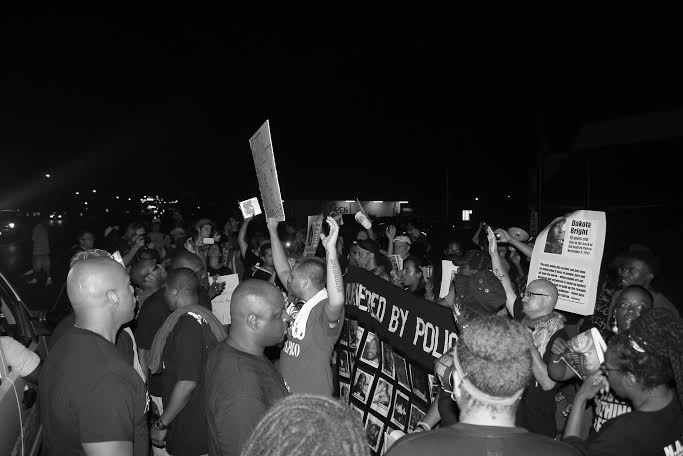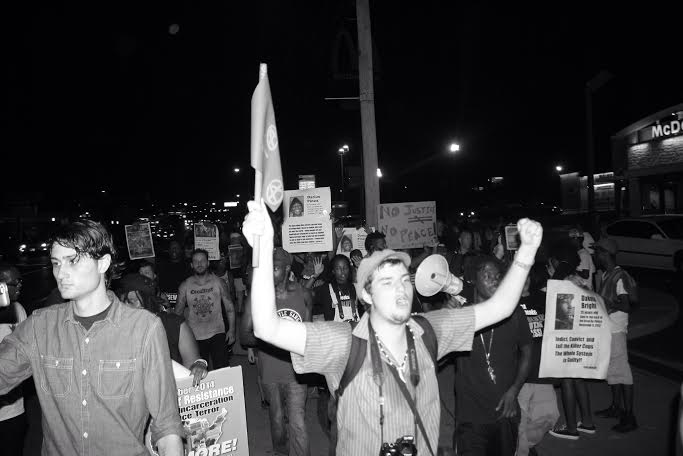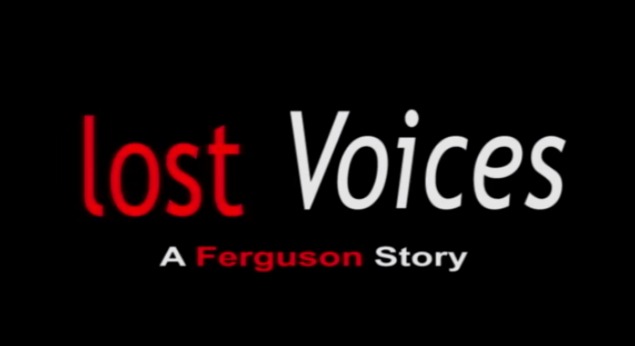Local Filmmakers Release First Documentary On Michael Brown Protests
By Ester Alegria in News on Jan 11, 2015 8:00PM
(Chicagoist regrets the omission of Kristiana Rae Colón of #LetUsBreathe Collective as Executive Producer of the film)
Flashing pictures showing brown faces, sprawling loc’d hair, hoodies and face masks and an infinite number of hands resting in the air in protest. The Lost Voices’ A Ferguson Story, America’s first Michael Brown documentary debuted last week at the Rainbow PUSH Coalition. The haunting documentary shows the swift and inevitable shift in America’s current social climate after the shooting death of the unarmed Missouri teenager by Ferguson police officer Darren Wilson.
The Lost Voices is a group formed after Brown’s death who plan to march monthly protesting police brutality. Shame, bitterness and heaviness of heart are all conveyed in the film, but in true American nature, hope springs forth in the veins of the downtrodden.
The documentary begins with the early '90s footage of the Rodney King beating, then silently segues to more modern brutality; the images don’t get any easier to watch. Nina Simone’s "Strange Fruit" ironically wafted through my computer’s speakers while I watched, like a call and response on a sugar cane field.
The film's concept was formed while Lonnie Edwards was getting ready for the Black Harvest Film Festival. The deaths of Eric Garner and Michael Brown prompted him to take action creatively. He headed down to Ferguson to aide in the relief efforts. While there, he shot about 10 percent of the film’s footage. The rest of the film he calls an “artist’s collage” collected from other documentarians from the area.
The concept of the project is really indicative of the nature of the way we view media today. Splices of videos here and there, different points-of-view, all fitting together to tell a story. It seems more honest than just one camera and one person. With so many eyes watching and analyzing, a half-truth would be hard to slip though the cracks. Yet, our reality stands.
One man in the documentary delivers a fervent monologue on how some wayward blacks may get hold of small hand guns and kill other black people. But the real threat is when the marginalized are provoked, get angry, stand together and start fighting with their minds.

Photo Credit: Noah Polk
I spoke with the film's photographer Noah Polk about his experience in Missouri.
Chicagoist: Noah, let's start with a two part question. Can you recall one of the most uplifting things you've encountered in Ferguson, as well as the most disheartening thing?
N.P: The most uplifting part of my Ferguson trip was the off camera conversations, where [their minds were] on issues as it pertains to their community—it's far off from how I feel about home (Chicago). It was nice to see that more people want better. It was like we were unified from a distance.
The most disheartening part would be talking to the news reporter. He worked for Fox2 and he was watching a row of about six cop cars sitting with their lights on. They weren't doing anything but looking like something serious was about happen. Behind him were blocks of peaceful protesters and he refused to turn around. It broke my heart but also reminded me of why I was there.
Chicagoist: We all grew up learning about the Montgomery Bus Protests and sit-ins. What went through your mind while shooting for the film as you witnessed the modern day revolutionaries?
N.P: Nothing different really passed my mind. I had always thought something needed to be done about a plethora of things, so the fact that I was in the midst of that felt right. It felt like I was in the right place doing the right thing so normal everyday things ran past my mind like, "what are we eating tonight?" or, "man it's hot down here."
__________________________________________________________
One scene in particular really stood out to me, and it kind of reminded me of the Eric Garner case. Though, this young man wasn't so bulky, and had no voice to say "I can't breathe." Edwards speaks at length about this case in the audio.
I spoke briefly with Chicagoans Lonnie Edwards, Director, Filmmaker and Executive Producer Todd Walton about the film:
While the footage is unclear as to what lead up to the unnerving arrest of the photos above, this can surely be said. The young man's body was grossly neglected, and he needed medical attention.
While viewing this film, I did not feel like a free woman. This is not the time to fight each other; this is time to be together—time to embrace both the ideals of Dr. King and Brother Malcolm. The moment an entire people get fed up is when the true danger starts.
Every race has their tiffs. There is no Asian on Asian crime. No Native on Native crime. There is just crime against humanity. What the young man was saying is that when a black man kills another black man, it's never OK, it's average human stupidity.
The film addresses the long-needed togetherness that the black community had been waiting for. Unfortunately, suffering tragedy after tragedy, arms have been forcibly intertwined, soothing anger, and invoking pride for self and culture.
Dear readers, I encourage debate in the comments, sharing on your timelines, Tumblrs, and Twitter feeds. Even if you believe this is "race-baiting" or "cop hatred," this deserves conversation. We all need to talk about this.

Photo Credit: Noah Polk
A Ferguson Story will be shown at Soho House in West Hollywood in Los Angeles on Jan. 14 and again at Peace Week in New York City, the date still to be determined.
Update: Unfortunately, film's viewing in Peace Week has been canceled.
The film is currently being privately funded and will soon be available to the public but please feel free to visit their site for further information.

